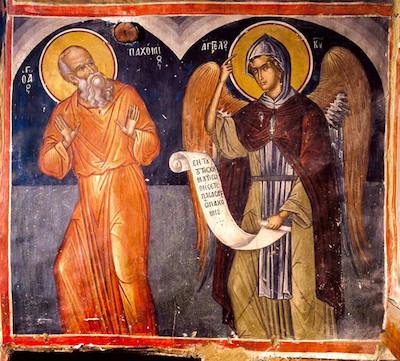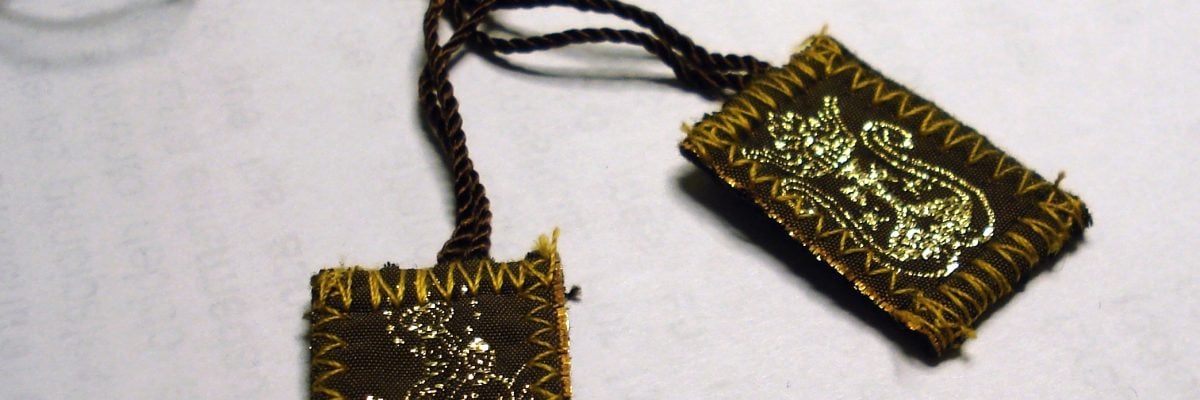
Homily for the Fifteenth Sunday in Ordinary Time, Year B
He chose us in him, before the foundation of the world,
to be holy and without blemish before him.
In love he destined us for adoption to himself through Jesus Christ,
in accord with the favor of his will,
for the praise of the glory of his grace
that he granted us in the beloved (Eph. 1:4-6).
“Whosoever dies wearing this scapular shall not suffer eternal fire.”
Many of us have seen brown scapulars of Our Lady of Mount Carmel on which these words are inscribed. I have one on right now. Her feast day is tomorrow, as each year, on the sixteenth of July. Once, many years ago, an aunt of mine, who was a serious Protestant, saw these words on my scapular, and, let us say, she was not amused.
Such an assertion seemed to her to confirm the worst stereotype of Catholic devotion to physical objects of piety. Imagine, eternal life guaranteed just for having a little piece of magic cloth around your neck! Well, I tried in my youthful way to explain to her what these words actually meant, but she was unimpressed. Being a polite Episcopalian, she just let the matter drop. After all, the thing was so clearly off base in her estimation that she did not need my discussion of the question!
Well, setting aside the question of the prudence of embroidering such a statement on a scapular, let’s consider how it got there and what it could possibly mean. After all, my aunt’s reservations were not, on the face of things, entirely unreasonable.
In order to understand the scapular promise, we need to go back a bit in time—at least to the fourth century. St. Pachomius was the first Father of the Church to establish a stable rule and habit and cycle of prayer for monasteries. Before him, there were certainly monasteries (in fact, the first Christians of Jerusalem practically lived a monastic life), but he was the first to set up a form that could be copied and reproduced as a rule. Pachomius was the first to receive a heavenly visitation. An angel appeared to him and promised him that anyone who wore his habit and followed his way of monastic life would attain eternal salvation. There are numerous icons in the Christian East that depict this vision. Here is one. Note the angel’s indication of the monastic hood and scapular:

Various founders of religious orders over time had similar experiences. The most well-known was that of St. Simon Stock in the thirteenth century. This saint (whose feast is May 16) was given the habit of the Carmelites by Our Lady with the promise that whoever persevered in the habit and was faithful to her office, namely the office of Our Lady from the Liturgy of the Hours, and to abstinence on Wednesdays, Fridays, and Saturdays, would be saved and even liberated from purgatory on the first Saturday after death.
This is the origin of the popular devotion to the Carmelite scapular. It must be remembered, however, that this is not magic. It assumes an attachment to and perseverance in prayer and some form of penance, not just the wearing of a physical object.
Other orders have similar stories. My own order, the Norbertines—or the Canons Regular of Prémontré—received their habit from Our Lady and their rule from St. Augustine, who promised that those who followed his rule would have a good defense on the day of judgment.
The most recent account, from the 1700s, is from St. Paul of the Cross, to whom Our Lady appeared with the Passionist habit. We have his account in his own handwriting, so no one can claim that it is just a hagiographer’s imagination. Let us look carefully at what he tells us:
When I saw the holy tunic presented to me, I did not see any corporeal form; I saw it in God, that is, that is the soul knows that it is God, because he makes it understand this, by an intelligence infused into the soul.
Here is the point we need to understand. Just as the Lord and his apostles give us numerous and generous assurances of salvation in the New Testament for giving a cup of cold water in his name, or for doing anything for the least of his brethren, so too these later assurances do not mean that we get to ignore or neglect the whole order of the commandments in favor of some little practice of piety. The promises attached to the wearing of the scapular, or to the recitation of the rosary or of the chaplet of Divine Mercy, are all simply the same promises that characterize the promises of the Lord in the Gospels. All these devotional practices do is make our works concrete and relate them to the mystery of the Word Made Flesh. They do not give us a pass on living an upright life in accordance with the commandments.
Let us look again at the words of St. Paul of the Cross:
When I saw the holy tunic presented to me, I did not see any corporeal form; I saw it in God, that is, that is the soul knows that it is God, because he makes it understand this, by an intelligence infused into the soul.
Wow! “I saw it in God!” This might explain the power of the sacramentals that our Savior and his Blessed Mother and the saints have recommended to us over the centuries. This is a very profound insight that tells us that we are not dealing with simply material objects or charms but with outward signs of God’s will that we live in union with him and persevere in his love until death. This is what the apostle tells us in today’s second lesson:
In love he destined us for adoption to himself through Jesus Christ, in accord with the favor of his will, for the praise of the glory of his grace that he granted us in the beloved.
This is the sense of the various promises attached to objects of religious profession and devotion: God’s saving will and his grace. Let us make grateful and good use of these means of salvation, small as they are, even as small as a cup of cold water or a good deed done to the least of his brethren!
Image credit: Sarah Sofia



